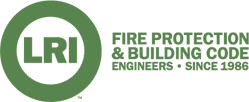What is a Building Risk Audit?
Building Risk Audits are one of the most effective ways to mitigate risks within your building portfolio. LRI Engineering’s Building Risk Audit is a thorough and systematic examination of a building’s infrastructure, equipment, safety system documentation and facility use. LRI’s experts conduct a detailed assessment of each site illuminating potential hazards to life and property. The audit assesses Building and Fire Code elements including; fire protection and alarm systems, fire safety plans, and general compliance with applicable Codes and Standards.
Key Benefits for the Risk Market:
1.Geographic Sensitivity: Providing insurance companies with a clear understanding of the defects or hazards that exist within the context of the regulatory framework enforced in the area.
2.Improved Risk Management: By identifying hazards and nonconformances within the building, insurance companies can recommend or enforce risk-reducing measures.
3.Enhanced Renewal Negotiations: Detailed Building Risk Audit reports support your company’s position and demonstrate due diligence during negotiations.
Key Benefits for Building Owners:
1.Ensuring Safety Compliance: Building Risk Audits help building owners stay compliant with applicable building and fire codes.
2.Transparency Throughout Negotiations: Proactive risk management translates to a reduced likelihood of incidents and claims. Maintaining a compliant operation also simplifies insurance policy renewals when the time comes.
3.Peace of Mind: Provide expertise and experience provide building owners with the peace of mind that their properties are safe.
Why Choose LRI Engineering?
LRI provides specialized expertise, adaptability, and comprehensive reporting. Our team of engineers and safety experts work with clients across a diverse spectrum of industries and different building types. A Building Risk Audit can be customized to your specific needs, ensuring the right questions are answered, empowering insurance companies and building owners to make informed decisions about their facilities and operations.

